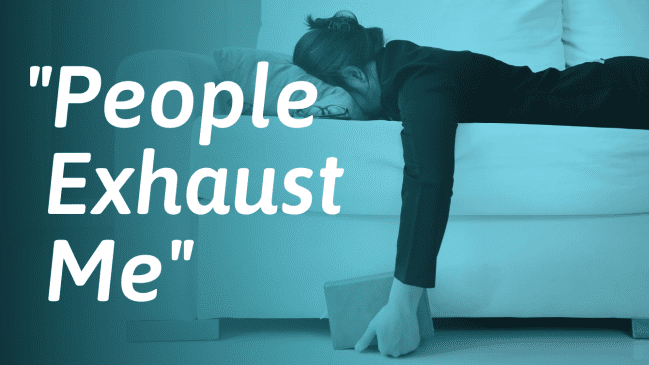“Why do I find talking exhausting? People exhaust me. I know I’m introverted, but I often feel too tired to socialize. I think I need time alone more than most people. Is there anything I should be doing differently? I want to have friends, but I don’t want to feel super drained all the time.”
As an introvert myself, I know how exhausted I am after a day of interacting with people.
This guide will discuss introvert burnout, its common symptoms, and how to prevent it in the future.
Introversion is a personality trait that’s often misunderstood and stigmatized. For more information about introversion, see our extensive guide on the best books for introverts.
Sections
Common questions
Here are some common questions you may have about introversion.
Why do I find talking exhausting?
You may be an introvert. Introverts tend to be more quiet and reflective. They can become overstimulated when they’re around too many people. You may enjoy the company of others, but you probably don’t like socializing all day.
What do introverts need to feel recharged?
Introverts need time for reflection and introspection. They need time alone to recharge their emotional batteries. Examples of recharge-activities for an introvert can be spending time in nature, listening to music, working out, or reading.
How much time do introverts need to recharge?
The amount of time varies depending on the person. Some introverts need hours of solitude each day. Others need a dedicated few moments each week. There isn’t a right-or-wrong amount of time- you may need to play around with different numbers to find your right fit.
Do introverts want friends?
It’s a misconception that introverts don’t enjoy socialization. Many introverts crave connection with other people. They want to have meaningful relationships and deep conversations. But they usually don’t want to spend hours socializing with large groups of people.
Are introverts shy?
Some introverts are shy, but shyness and introversion aren’t the same things. It’s possible to be quite outgoing and social, but also feel introverted.
What happens when introverts don’t get enough alone time?
If introverts don’t get enough alone time, they can become overstimulated. This overstimulation can happen quickly, and it may occur before they even realize it. The overstimulation can lead to exhaustion, and to recover, they need to spend time by themselves.
For example, an extrovert may love a loud party full of people and entertainment. They feed off the energy in the room. It excites and rejuvenates them. An introvert may attend the same party but feel completely overwhelmed by the scene.
What does social exhaustion feel like?
Think about having a cell phone. We may start our days fully charged, but different activities can zap our energy. By noon, you may be running on less than 10%. Of course, we all have different stressors that can affect our battery. That said, nobody is efficient (or very happy) with a social battery drained.
What are the key signs of social exhaustion?
- Feeling detached or numb from other people
- Feeling like you can’t focus on anything
- Having a headache or migraine
- Fatigue and low energy
- Experiencing an emotional meltdown
- Irritability
- Depression
If you consistently feel drained, you’re at risk for experiencing introvert burnout.
What is introvert burnout?
Introvert burnout refers to a chronic and prolonged state of social exhaustion. It’s not just about feeling a little drained one day. It’s about feeling drained for many days in a row- and it eventually causes you to feel completely overwhelmed.
What does introvert burnout feel like?
Introvert burnout can feel like hitting a wall. You may feel like you’re on the brink of a breakdown. At the same time, you may also feel completely drained, like you don’t have the energy to take another step. In some ways, you’re running on empty, and it feels like a gas station is a million miles away.
Chronic introvert burnout can happen to any introvert. However, you may not recognize the struggle until you’re in the middle of it.
Here are some common risk factors:
- Working in a job that requires lots of daily interactions.
- Traveling with a group of people.
- Spending time with a lot of family/people in a short amount of time.
- Needing to attend numerous social events.
Anytime you feel obligated to socialize with many people at once, you may face an introvert hangover. This hangover doesn’t necessarily lead to burnout, but too many hangovers in a short period of time can cause depression, anxiety, and resentment.
How long does an introvert hangover last?
How long an introvert hangover lasts depends on the person. A hangover may start to improve dramatically once you have time to recharge. This means it may only take a few hours for you to feel better.
But if you’re suffering from serious burnout, it may take longer. You will need to make some lifestyle changes to cope with your symptoms.
Can exercise help with introvert hangover?
Yes, exercise can be an excellent coping tool for feeling overwhelmed.
Working out can improve your physical and emotional health. As an introvert, it provides you with the opportunity to recharge.
Here are some popular solo activities you may want to consider trying:
- Running.
- Hiking or walking.
- Lifting weights.
- Swimming.
- Rock climbing.
- Cycling.
For more on how introverts embrace exercise, check out this article by Huffington Post. Try to build in time for exercise several times a week.
How do you recover from introvert burnout?
Recovering from introvert burnout is possible. The first step is awareness. Are you continuing to put yourself in uncomfortable situations? Are you “powering through your days” with no downtime for rest? Do you pretend like you’re not stressed?
In this guide, we’ll go in-depth into how to overcome introvert burnout.
How do you overcome social exhaustion?
On a scale from 1-10, rank your level of social exhaustion right now. ‘1’ means you’re feeling as positive and energized as possible. ‘10’ means you feel like you’re drowning, and you never want to speak to another person again!
What should you do with your social exhaustion number?
Consider any number between 1-3 as in the green zone. Once you’re at a level 4, it means you’re in the yellow zone. That means it’s important to take action.
If you don’t, you risk moving to a level 6-7, which enters the red zone (which usually means you’re at full-out burnout). By the time you’re at that level, it can feel that much more challenging to intervene.
How to overcome introvert burnout and social exhaustion
No matter your personal situation, here are some universal strategies for coping with your exhaustion. Keep in mind that these suggestions take time and practice. They probably won’t work overnight. Consistency is key.
1. Accept your introversion rather than fight it
Introversion isn’t a bad thing! Learning to embrace who you are can help you feel more confident. It also may give you permission to honor your needs and desires.
Unfortunately, we live in a world that tends to favor extroversion. But that doesn’t mean you need to change! Introverts have numerous gifts. They tend to be good listeners, thoughtful, observant, and compassionate. They tend to enjoy emotional intimacy with others, and they value building deep connections.
If you want some motivation, check out this article about self-acceptance as an introvert by Lifehack.
2. Identify your main triggers
Do certain people or situations trigger your exhaustion? Are you more tired during certain parts of the day?
Identify your triggers, and write them down on a list. Some common triggers include:
- Feeling obligated to speak to a lot of people at one time.
- Attending family reunions or holiday parties.
- Needing to socialize for work.
- Attending a large event and needing to stay for a long time.
Completing this exercise will help increase your awareness. For example, if you’re faced with several triggers at the same time, you can prepare yourself to manage them appropriately.
3. Write down the things that help you feel recharged
What gives you a sense of energy or pleasure? When you need a mental boost, what do you do? Write them down.
If you’re not sure, here are some suggestions worth trying:
- Reading a book or magazine.
- Listening to your favorite songs.
- Journaling.
- Exercising.
- Meditating.
- Making food and enjoying a meal alone.
- Taking a nap.
- Taking a warm bath or shower.
- Engaging in a solo hobby (gardening, photography, etc.)
Having a list helps you identify what to do when you start feeling overwhelmed. You can go down this list one by one to select activities to restore your energy.
4. Don’t say “yes” to every social event
Cramming your schedule will only make you feel more exhausted. Choose quality over quantity- you don’t have to agree to everything, but commit to the things that are meaningful to you.
Of course, it’s important to say “yes” to some things! Isolation isn’t good for introverts- too much solitude isn’t the answer for anyone. Even though you may require less interaction than extroverts, it doesn’t mean you don’t benefit from relationships.
5. Schedule alone-time each day
Set aside at least 10 minutes a day that is entirely yours. If you live with others, let them know to avoid disturbing you. Use this time to meditate, journal, take a shower, or any other activity that makes you feel recharged.
Simply knowing you have this time can help you power through uncomfortable moments throughout the day. It gives you something to look forward to if you’re feeling overwhelmed.
6. Use online relationships to your advantage
Sometimes, it may be easier to connect with others online. You can participate in forums or other communities. The best part is that the socialization is on your terms. You can turn it on or off whenever you want- no need to worry about making an excuse to dip out.
See our guide on making online friends.
7. Take micro-breaks
When you socialize, take small breaks throughout your interaction. This could include taking several deep breaths in the bathroom or simply explaining “I’ve been socializing so much so I’m going to take 10 minutes to just clear my head” and take a short walk outside.
8. Explain your situation to people around you
If you feel comfortable doing it, explain to people you often interact with that social interaction puts a strain on you. Let them know that you need alone-time and that it’s just how you work.
Avoid making up explanations for not socializing. Rather, be honest and say something like “I’d love to meet up with you guys, but I’m too exhausted right now so I’m going to take the weekend off. I’d love to meet with you next time, though”.
9. Challenge yourself a little bit
It’s important that you find a level of social interaction that challenges you a little bit, without exhausting you. If you cut off all social interaction that feels uncomfortable, there’s a risk that you self-isolate or develop (or worsen existing) social anxiety. Find a middle road where you practice socializing regularly but also get proper rest in between.
You might find this article on being more extroverted without losing your personality helpful.
Tips for college/dorms
College can be both exciting and terrifying for introverts. You want to make friends, but the endless social opportunities may feel incredibly overwhelming.
Here are some tips to consider.
Join 1-2 clubs
Although it may seem counterintuitive, some socialization can help prevent social exhaustion. That’s because you’re choosing to devote time and energy to those activities. When you do, you won’t feel the same need to attend social events that don’t interest you.
Find a meal buddy
Try to find a friend you can eat lunch or dinner with a few times a week. This gives you the opportunity to socialize, but not in an incredibly exhausting way.
Study alone
You don’t have to join study groups if you find them overwhelming. It’s perfectly reasonable to spend your time studying or reviewing notes alone.
Tips for work
Some jobs require a lot of colleague or client interaction. But even less-social jobs can feel draining.
Here are some more tips for preserving your energy.
Find another introvert
Chances are, you aren’t the only introvert in the office! Think about the other people who may seem quieter or more low-key. Try and build more of a connection with them. They will understand your need for alone time and recharging.
Embrace writing
Some introverts feel more comfortable writing than speaking. If that’s the case, try to focus on sending emails instead of scheduling meetings. Of course, you can’t do everything through an email, but it’s okay to lean on that when you need to recharge.
Put a ‘do not disturb’ sign on your door
If you really need a few minutes to be left alone, let your coworkers know. Just don’t have that hanging on your door all the time- this can come across as standoffish, which can hurt your professional reputation.
Tips for relationships
It can be hard to be with an extroverted partner when you’re introverted. They may not fully understand your need to recharge. They might also feel rejected or confused when you crave more solitude.
Here are some tips.
Teach them about introversion
Introversion isn’t a choice, and some people don’t realize that! They may just think you’re feeling quiet, shy, or even antisocial. Talk to your partner about introversion. This article by The Atlantic can help drive the point home.
Have a code word
It’s a good idea to think of a code word you can use to let your partner know you’re feeling overwhelmed. Have a plan for what you will do if you use this code word. For example, it might mean that you’re going to leave together. Or, it might mean that you need to leave, and they can stay.
Spend alone time (together)
Many introverts enjoy being in the same room as other people. They just don’t want to feel pressure to perform socially. But you might enjoy watching a show together or sitting quietly and reading books. This allows you to stay connected while also recharging.
Tips for people with Aspergers, Autism, or ADHD
Socialization can be tricky if you have Aspergers or autism. It can be even trickier if you identify as an introvert. If you’re struggling to make friends, check out our guide on the topic.
Engage in small and short interactions
You can have meaningful connections without feeling completely overwhelmed. Try and focus on having a few conversations with just 1-2 people at a time. This allows you to slow down and practice active listening.
Create a self-soothing routine
Create a routine that can calm or ground you anywhere. For example, a routine might be practicing a positive mantra like I am going to be okay and then excusing yourself to the bathroom for a few moments.
Try to make a routine that you can replicate in any situation. The more you practice it, the more automatic it will feel.
Tips for people with depression
It can be hard to tell the difference between social exhaustion and clinical depression. That’s because depression has symptoms like irritability, withdrawal, and fatigue. There can definitely be a crossover between both conditions.
Here are some considerations.
Choose pleasant activities that you enjoy with friends
If you don’t like big parties, don’t go to big parties. But if you love hiking, ask a friend if they’d like to go with you. In other words, plan social events that are more on your terms.
Your depression might try to talk you out of it, but try to stick with your commitments. You’ll feel much better in the long run.
Meditate more often
Mindfulness can help with depression and social exhaustion. Meditation doesn’t need to be complicated to be effective.
Set a timer on your phone for five minutes. Close your eyes, and take a deep breath and hold for five counts. Then, exhale and hold for five counts.
Repeat this process until the timer goes off. Do this a few times a day. You will start to feel more centered and grounded.
Seek professional help
If your depression isn’t getting better (or is worsening), consider reaching out for professional support. Therapy or medication can help reduce some of your symptoms. It can also “lift the fog” that may make socialization feel incredibly draining.
We recommend BetterHelp for online therapy, since they offer unlimited messaging and a weekly session, and are cheaper than going to a therapist's office.
Their plans start at $64 per week. If you use this link, you get 20% off your first month at BetterHelp + a $50 coupon valid for any SocialSelf course: Click here to learn more about BetterHelp.
(To receive your $50 SocialSelf coupon, sign up with our link. Then, email BetterHelp’s order confirmation to us to receive your personal code. You can use this code for any of our courses.)






I have known that I am an introvert for a long time, but recently it feels that my compulsion to get away from every human being getting stronger, I even didn’t want to pick up the phone when my best friend (also an introvert) called for a casual chat. After reading this today I think this might be what is happening to me, hopefully, the remedy will work and everything will be back on track.
Thank you. Very much. I had suspected, but feeling emotionally numb after being around hundreds of people over the last 2 days makes a lot of sense now. That is not the norm for me.